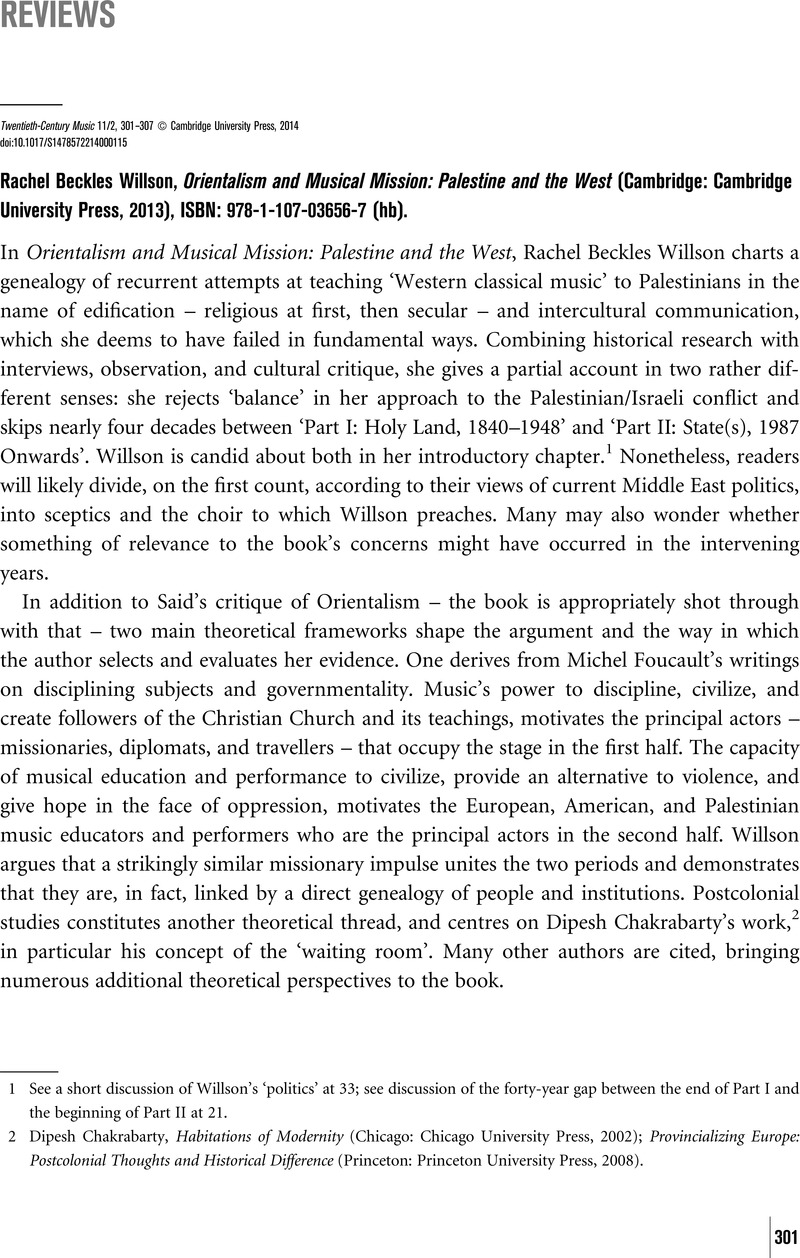No CrossRef data available.
Article contents
Rachel Beckles Willson, Orientalism and Musical Mission: Palestine and the West (Cambridge: Cambridge University Press, 2013), ISBN: 978-1-107-03656-7 (hb).
Published online by Cambridge University Press: 30 July 2014
Abstract

- Type
- Reviews
- Information
- Copyright
- Copyright © Cambridge University Press 2014
References
1 See a short discussion of Willson's ‘politics’ at 33; see discussion of the forty-year gap between the end of Part I and the beginning of Part II at 21.
2 Chakrabarty, Dipesh, Habitations of Modernity (Chicago: Chicago University Press, 2002)Google Scholar; Provincializing Europe: Postcolonial Thoughts and Historical Difference (Princeton: Princeton University Press, 2008).
3 Hirshberg, Jehoash, Music in the Jewish Community of Palestine, 1880–1948: A Social History (Oxford: Oxford University Press, 1995)Google Scholar; Segev, Tom, One Palestine, Complete: Jews and Arabs Under the British Mandate (New York: Henry Holt and Company, 2000)Google Scholar.
4 Mitchell, Timothy, Colonizing Egypt (Berkeley: University of California Press, 1991)Google Scholar.
5 Stokes, Martin, ‘Introduction: Ethnicity, Identity and Music’, in Ethnicity, Identity and Music: The Musical Construction of Place, ed. Stokes, Martin (Oxford: Berg, 1994), 1–28Google Scholar.
6 Chakrabarty, Provincializing Europe.
7 Pratt, Mary Louise, Imperial Eyes: Travel and Transculturation (London: Routledge, 1992)CrossRefGoogle Scholar.
8 Regev, Motti, ‘Present Absentee: Arab Music in Israeli Culture’, Public Culture 7/2 (1995), 433–45CrossRefGoogle Scholar.
9 See Brinner, Benjamin, Playing Across a Divide: Israeli-Palestinian Musical Encounters (New York: Oxford University Press, 2009)CrossRefGoogle Scholar.
10 McGrane, Bernard, Beyond Anthropology: Society and the Other (New York: Columbia University Press, 1989)Google Scholar.
11 Butler, Judith, Precarious Life: The Powers of Mourning and Violence (London: Verso, 2004)Google Scholar; Yúdice, George, The Expediency of Culture: Uses of Culture in the Global Era (Durham: Duke University Press: 2003)Google Scholar.
12 Racy, Ali Jihad, Making Music in the Arab World: The Culture and Artistry of Tarab (Cambridge: Cambridge University Press, 2003), 18–31Google Scholar.
13 Brinner, Playing Across a Divide, 60–3.
14 The UN refugee commission estimated 711,000 refugees. United Nations Conciliation Commission for Palestine. General Progress Report and Supplementary Report of the United Nations Conciliation Commission for Palestine Covering the Period from 11 December 1949 to 23 October 1950 (New York: United Nations, 1951)Google Scholar, Appendix 4, ‘Execution of the Terms of Reference’, item 15.
15 Brinner, Benjamin, ‘Beyond Israelis vs. Palestinians or Jews vs. Arabs: The Social Ramifications of Musical Interaction’, Music and Anthropology 8 (2004)Google Scholar; Brinner, Playing Across a Divide.
16 See, for example, Dardashti, Galeet, ‘“Sing us a Mawwal”: The Politics of Culture-Brokering Palestinian Israeli Musicians’, Min-Ad: Israel Studies in Musicology Online 7/2 (2009), 62–91 <www.biu.ac.il/hu/mu/min-ad/8-9-II/05-Dardashti-Sing_us_a_Mawal.pdf> (accessed 19 May 2014)Google Scholar.
17 While Willson writes that ‘certain Arab musicians joined the Israeli World Music scene briefly in the mid 1990s’ (22, fn 80), this is actually an ongoing phenomenon that began around 1991 and has now lasted more than two decades. Positioning Regev 1995 as interpreting this phenomenon from a perspective opposite to mine is misleading. We both discuss at length the struggle for Palestinians living within Israel, but Regev's work addresses a situation that has since changed considerably.




